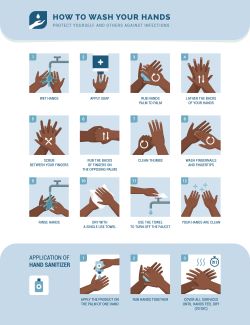
How to was your hands picture.
Facts About Hand Washing
Studies about the prevalence of bacteria on hands and common items may be cause for paranoia. But remember: Not all bacteria is harmful, and even the vast majority of harmful bacteria is too weak to sicken someone with a healthy immune system. That being said, it helps to remember that not everyone has a healthy immune system. Hand washing is not just an act of personal health, but one of public health.• Hand washing is the most effective and inexpensive way to prevent the spread of infectious diseases.
• 1 in 6 mobile phones, and as much as 94% of dollar bills have been found to be contaminated.
• On average, only 38.7% of households practice hand washing with soap.
• Research on bathroom habits has shown that 95% of people don't wash correctly.
• Hand washing can reduce the mortality rates of respiratory and diarrheal diseases in children by almost 50%.
• In the United States, there are 48 million cases of foodborne illness per year.
What Does Hand Washing Fight Against?
Hand washing seems like a small act, but the diseases it can prevent are numerous. These illnesses are incredibly contagious, and can include: influenza, respiratory infections, diarrheal illnesses, foodborne illnesses, MRSA, eye infections, strep throat, COVID-19 and impetigo.
When To Wash Your Hands
You should wash your hands before and after handling food, visiting or caring for someone with an illness, treating a wound, eating or feeding a child. You should also wash your hands after blowing your nose, coughing, sneezing, contact with any other bodily fluids, touching an animal (it's waste or food), using the toilet, changing a diaper, handling garbage or if hands become visibly dirty. For a daily act, hand washing often seems to be inadequately practiced and understood. Studies by health organizations have regularly confirmed that people wash their hands improperly, most often for too little time or with too little attention to all the parts of our hands.
How to Properly Wash Your Hands
The most effective hand washing method is to wet your hands with running water and apply soap. Rub your hand together to make a lather and continue rubbing them for at least 20 seconds. (This would equal singing Happy Birthday twice), Rinse your hands under running water and dry them using a clean towel or paper towel. Getting into the habit of proper hand washing early helps to create a good habit that will help children stay healthy, particularly while young and prone to sickness.
Remember, Wash your hands not only for you, but for others around you.
From the Infection Control Department at Sabetha Community Hospital
